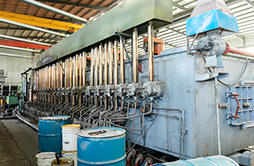wholesale washers supplier
12月 . 21, 2024 18:09 Back to list
wholesale washers supplier
The Role of Wholesale Washer Suppliers in the Modern Marketplace
In today's fast-paced economic landscape, the demand for efficient and reliable suppliers has never been more critical. Among the essential components of various industries is the washer, a seemingly simple yet vital part used in numerous applications, from automotive to construction and manufacturing. Wholesale washer suppliers play a crucial role in ensuring businesses have easy access to these necessary items, impacting the efficiency and effectiveness of operations across the board.
Understanding Washers and Their Importance
Washers are small but essential components designed to distribute the load of a threaded fastener, such as a screw or bolt. They serve multiple purposes reducing friction, providing a seal against leakage, and preventing loosening due to vibration. Given their variety, from flat washers to lock washers and fender washers, the right type can make a significant difference in the performance and durability of a product. As industries ramp up production and focus on quality, the demand for high-quality washers continues to grow.
The Wholesale Advantage
Wholesale washer suppliers offer several key advantages that set them apart from retail vendors. Firstly, wholesale suppliers typically provide lower prices due to bulk purchasing. By buying in larger quantities, businesses can secure significant savings, making it a financially viable option for companies of all sizes. This cost-effectiveness is particularly beneficial for manufacturers and assembly plants where numerous washers are required daily.
Secondly, wholesale suppliers often have a broader range of products. A reliable wholesale washer supplier maintains an extensive inventory, ensuring that businesses have access to various types of washers, including specialty items that may not be available at local retail stores. This variety is essential not only for meeting immediate needs but also for supporting innovation and customization in manufacturing processes.
wholesale washers supplier

Building Strong Relationships
Establishing a relationship with a wholesale washer supplier can lead to numerous benefits. Long-term partnerships foster trust and reliability, making it easier for businesses to forecast their needs and streamline purchasing processes. Suppliers that understand their clients' requirements can offer personalized recommendations, ensuring that companies select the right washers for their specific applications.
Additionally, strong supplier relationships often come with enhanced customer service. Wholesale suppliers that prioritize building rapport with their clients are more likely to provide timely support, whether through quick order fulfillment or expert advice on the types of washers needed for particular projects. This connectivity can prove invaluable, especially when facing tight deadlines or unexpected production challenges.
The Shift Towards Sustainability
In recent years, the focus on sustainability has significantly impacted how wholesale washer suppliers operate. Many businesses are now seeking suppliers committed to environmentally friendly practices. This trend includes sourcing raw materials responsibly, reducing waste, and producing washers that are recyclable. Suppliers that prioritize sustainability not only help their customers meet changing regulatory requirements but also align with a growing consumer demand for more eco-conscious products.
Conclusion
Wholesale washer suppliers are vital players in the modern marketplace, providing essential components that support various industries. Their ability to offer cost-effective solutions, extensive product ranges, and personalized service positions them as indispensable partners in manufacturing and construction. As businesses increasingly focus on sustainability, suppliers that adapt to these new demands will continue to thrive. Overall, the partnership between manufacturers and wholesale washer suppliers is crucial for maintaining efficient operations and driving innovation, underscoring the importance of these often-overlooked components in the economic machinery.
Latest news
-
Durable Bolts for Lawn Mower Handle - Top Supplier & Manufacturer
NewsAug.22,2025
-
High-Quality Bolts for Lawn Mower Handle Supplier & Manufacturer
NewsAug.21,2025
-
Reliable Axle Nuts Supplier | High-Quality Automotive Parts
NewsAug.19,2025
-
Premium Wire Bolts Suppliers | Durable & Reliable Fasteners
NewsAug.18,2025
-
Leading Metric Wood Screw Companies & Manufacturers
NewsAug.17,2025
-
Top Wire Bolts Suppliers - Quality & Durable Fasteners
NewsAug.15,2025
